Forxy is a popular proxy service among web scrapers because of its vast list of high-quality and safe IP addresses that can bypass web filters. Those addresses allow you to research, scrape data, and unblock geo-restricted content online. If that is not enough, this proxy guarantees complete anonymity and offers IP leak protection.
If you know a little about Froxy’s proxy service, you found the right review. Here, we will tell you about this site’s features, services, pricing plans, and customer support. Let’s get started.
Froxy review at a glance
| Country | Estonia |
| Founded | 2021 |
| Proxy infrastructure | Datacenter, ISP, residential, and mobile |
| Pricing | $8/month |
| Customer support | Email support, live chat support, and FAQs |
| Free trial | No |
| Payment methods | Credit/Debit cards, Wire transfer, Crypto, etc. |
Pros and cons of Froxy
- Multiple IP addresses
- Good option for web scraping
- Offers 24/7 customer support
- Accepts payments via crypto
- Intuitive user interface
- Customer support takes time to respond
- Doesn’t work with some platforms
Froxy: What is it?
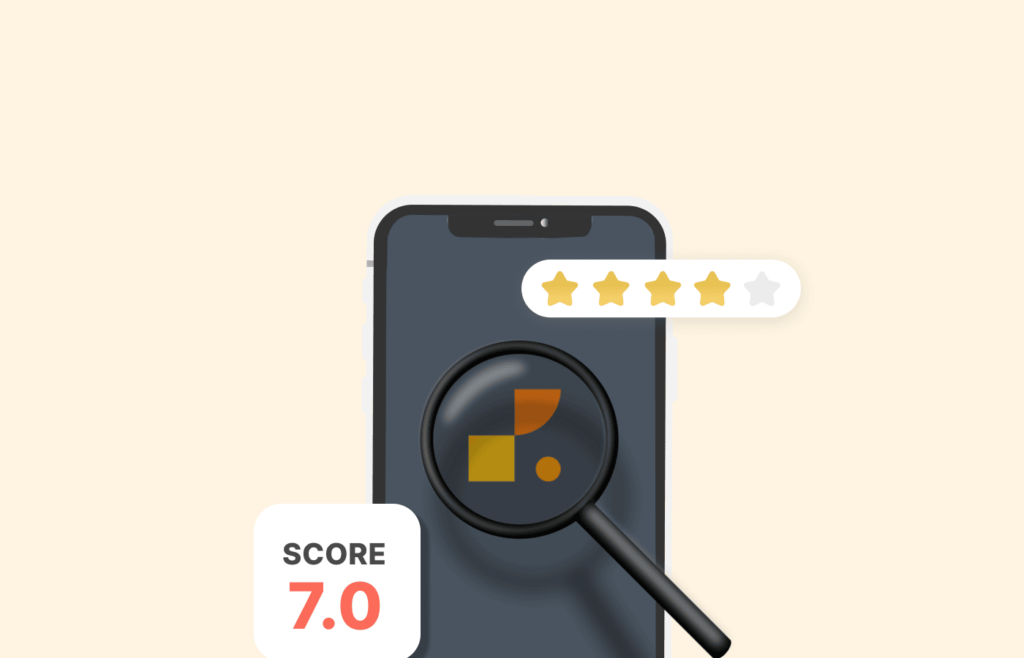
Froxy is because it is one of the newest proxy service vendors. It was founded as recently as September 2021 by the Estonian software company Wargames OU. It has quickly earned a loyal following in the United States and Russia.
Froxy is a fully-fledged platform that offers many different services at very competitive prices, given the current market prices. You can have mobile or residential proxies with their respective traffic allocations. The network’s uptime is guaranteed to be 99,9%, so your spiders, bots, and other terrific pieces of software can keep running 24/7.
The company’s customer service includes a dedicated technical support team.
The network includes more than 200 nodes scattered worldwide.
In short, this is an excellent, versatile, and reliable proxy service. If you need only the standard proxy option, or if you need an exceptional service that will enable you to deploy your online data harvesting projects, Froxy has everything you need.
Residential proxy service
The residential rotating proxy is Froxy’s bread and butter. It’s built from gateways collected from several ISPs. This kind of traffic originates, for the most part, on desktop and laptop computers more than from portable devices.
The residential plan gives you unique IP addresses attached to actual-world networks. This allows you to ping to any location in your chosen world. And let’s not forget that it gives you infinite simultaneous connections without further payment or configuration.
And how about bandwidth? It’s limited, and it can go from 3 GB to 1 TB. You need to make sure you choose a plan that suits your usage. Otherwise, you could run out of bandwidth before your cycle completes. If that should happen, you will need to either upgrade or renew your package –which means you’ll have to pay extra.
Mobile Proxies by Froxy
As the name suggests, this service is for the smaller devices in the industry, such as mobile phones and tablets. This hardware usually goes online through a WiFi signal or a cellular network. Such a setup often facilitates bypassing firewalls, thus removing some of the friction you often find in accessing data or content.
The bandwidth in these plans is also limited to a quantity varying between 50GB and 1TB.
One of the most remarkable features of mobile proxy packages is the access to a massive number of 3G and 4G international networks. You also have the advantage of geo-targeted access for websites with locked content.
The 40 USD lower price for mobile proxies is relatively high for the industry’s average, primarily because it gives you only so many GBs. However, mobile data tends to be expensive in almost every case.
The speeds
The speeds in Froxy are outstanding, and we will give you more details in short, but before we delve into that, let us give you a friendly reminder. The speed you can have when you join any given network (a proxy in this case, but it could be a VPN, for instance) is rather complicated and depends on many factors, starting with your ISP, the hardware you are using, weather, geographical location, and more.
This means that while our speed testing is accurate (we’re cautious when we do these tests), it doesn’t necessarily reflect the experience you should expect for yourself. So, no, we didn’t get it wrong. But we can’t test from your office either.
We had the following results regarding speeds at Froxy:
- Latency. 310 milliseconds
- Upload speed. 6.3 Mbps
- Download average speed. 1.7 Mbps
The upload speeds are much higher than the download speeds, which is a bit of an anomaly.
But what do the numbers mean in terms of user experience? Well, since we’ve been working under the assumption that data harvesters are an essential user group for Froxy, we can say that they will be fine.
Data harvesting mostly involves the transference of text data in small quantities at a time. So, that application will work fine with Froxy. On the other hand, if you’re the kind of guy who’s expecting to transfer larger binary files, then this isn’t the optimal choice for you. While you can manage those tasks, you will also need a bit of patience and planning as you do so.
Security
The traffic in the Froxy servers is encrypted with HTTPS. Yes, we know: this encryption protocol doesn’t have the high reputation of the AES-128 or AES-256 you can find in a good VPN. But remember that while AES is unquestionably superior, it is also overkill. The fact is that any expert worth his salt will tell you that HTTPS encryption is a suitable protocol that can guarantee your safety in any digital environment.
SOCKS5 is also available, improving your protection by managing the login process into the network. But it does more than just open the doors for you. It remains active as you stay inside the network; it streamlines your connectivity and keeps your connection reliable and consistent in terms of performance. It also reduces packet losses so that your data collection is more efficient.
Froxy’s key features
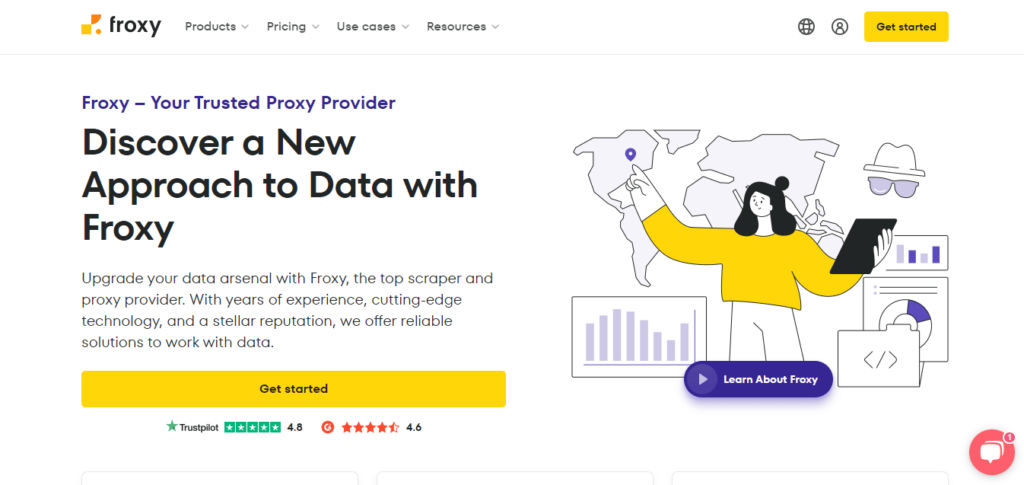
IP Pool
As a data harvester, your IP address is your passport and visa. So you need one that won’t trigger any of the aggressive measures against data harvest that are becoming common around the Internet.
Froxy has a list of more than eight million squeaky-clean IPs that will make your life easier.
The IPs ensure your online anonymity while you work. They’re sourced from the world’s best ISPs and mobile networks.
Protection against IP leaks
If privacy is a priority for you, your vendor’s ability to prevent IP leaks is essential. This feature keeps your actual IP address safe from any snooping third party. It works fine even when your Internet is intermittent.
The IP leak protection feature is always active by default in each of Froxy’s proxy servers. So anybody trying to tack your digital activities using your IP address will have a really hard (impossible, in practical terms) time getting the beans on you.
Session control
If you browse the web for Froxy reviews, you’ll find the words “session control” recur frequently, so let’s have a look at that feature in more detail.
The session control feature comes in two flavors: “sticky IPs” and “auto-rotate.”
The auto-rotate mode will manage your IP addresses automatically. The other option will swap your IP according to a schedule. So, every time you reach a predefined period, your IP changes. The maximum length of every period is one hour.
Unlimited sessions
You can have as many concurrent connections as you want within the Froxy network. This expands the IP numbers you can use as you do your thing. And that plethora of addresses at your disposal, in turn, decreases the probability of being banned. So that’s rotation working for you.
But there’s a downside. The bandwidth you can get with Froxy is limited. But is this a deal-breaker? We don’t think so. The network is exceedingly stable, which is a special feature.
Geo-targeted tasks
Geo-targeted tasks are one area in which Froxy excels. The servers are scattered over 220 territories. Once you pick a server in the network, your IP will rotate randomly to the selected regions.
But it gets better.
If you like to narrow your choices down, you can do it to the ISP level. You can switch ports and servers so your performance is optimal. This fine-tuning will allow you to collect data from anywhere on Earth efficiently.
User-friendliness
The user interface in Froxy is intuitive and straightforward. It shows a dashboard that can easily visualize everything you need to know or use. Newbies and seasoned users will find the tools they need here (server selection, port configuration, log-in details, and much more).
That was the general landscape, but look at the central part of the control panel. That’s where the geolocation controls are located. You will choose your country, region, city, and preferred ISP here.
Furthermore, screen tips will pop up as you move your pointer around the interface. This is a favorite feature among several reviewers. Every tip will give you a concise description of the functionality in question. This helps every kind of user. The less experienced ones could need all the help they can get, at least initially.
However, more expert users will also like the feature because no matter how experienced you are, you probably haven’t memorized every single functionality of every available option.
Customer support
Customer support is much like manuals. We always hope we won’t need to use them at all. The highly intuitive interface and the excellent quality of Froxy’s service guarantee that very few users will ever need expert help from the customer service team. But when you need it, it must be fast, accurate, friendly, and helpful.
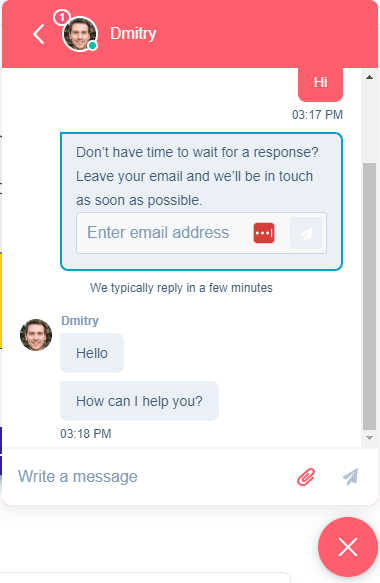
So how does it work? There’s a nice little pop-up widget that gives you access to the live chat agents. However, the agents may take a few minutes to respond. If you can’t wait, you can always submit a ticket on your own, and they will get back to you asap.
The live chat agents are friendly, know their stuff, and are ready to be helpful. Answers to tickets are fast (but bear in mind that a “fast” response to a ticket in this industry is about 24 hours), informative, and helpful as well.
Pricing and packages
Froxy offers 4 different types of proxies:
- Residential proxy
- Mobile proxy
- Fast proxy
- Datacenter proxy
The service offers these proxies at different prices. Let’s discuss the pricing and plan of each proxy type.
Residential proxy
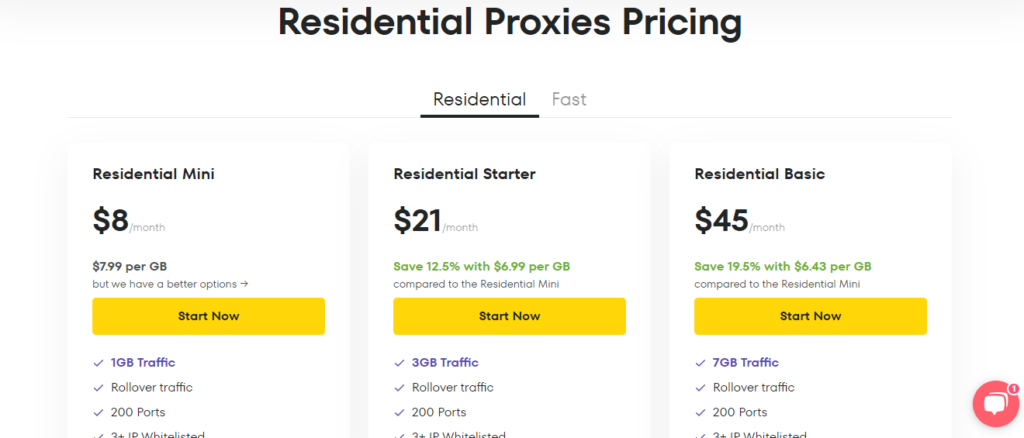
- Residential mini – $8/month
- Residential starter – $21/month
- Residential basic – $45/month
- Residential plus – $150/month
- Residential pro – $200/month
- Residential ultra – $3000/month
Mobile proxy
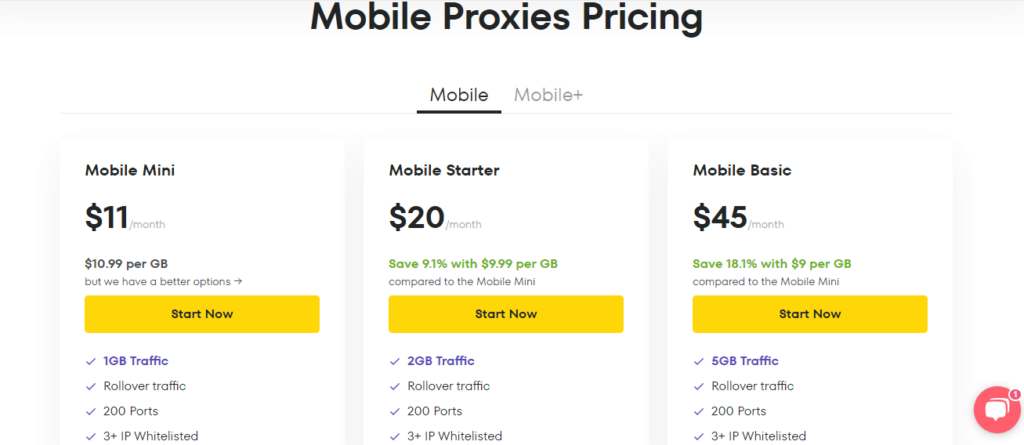
- Mobile mini – $11/month
- Mobile starter – $20/month
- Mobile basic – $45/month
- Mobile plus – $85/month
- Mobile pro – $150/month
- Mobile ultra – $700/month
Fast proxy
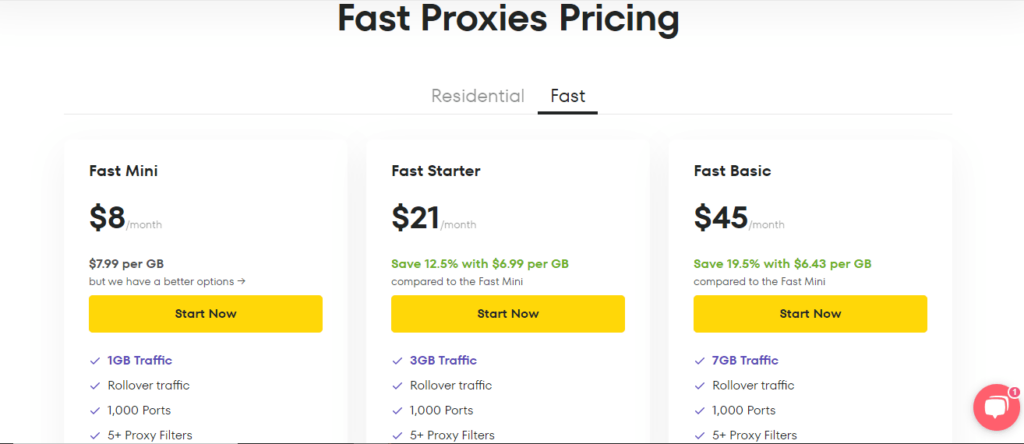
- Fast mini – $8/month
- Fast starter – $21/month
- Fast basic – $45/month
- Fast plus – $150/month
- Fast pro – $200/month
- Fast ultra – $3000/month
Datacenter proxy
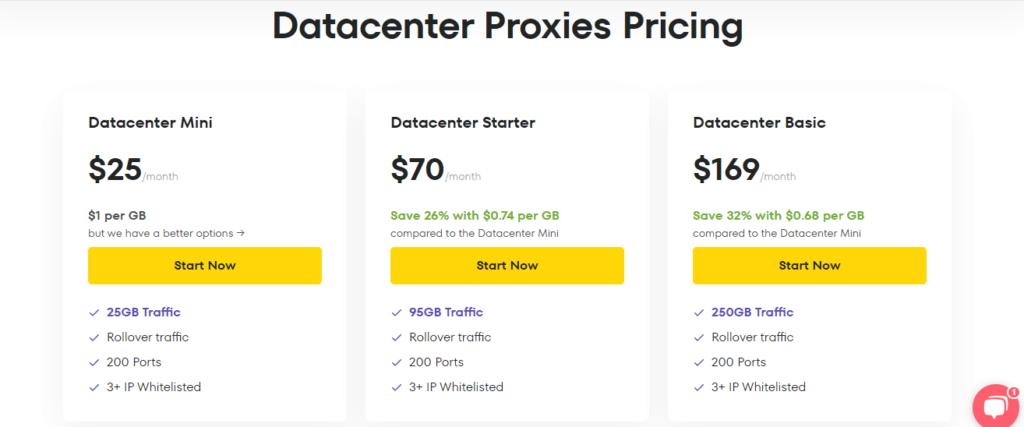
- Datacenter mini – $25/month
- Datacenter starter – $70/month
- Datacenter basic – $169/month
- Datacenter plus – $330/month
- Datacenter pro – $630/month
- Datacenter ultra – $1150/month
You’ll be disappointed if you like the 30-day or 60-day money-back policies that have become the rule in most VPN and proxy server providers. Unfortunately, no such thing is on offer on the website. The refund options are limited as well. However, you can test the service for three days using the 1.99 USD package.
Payment is available through PayPal, WebMoney, and some cryptocurrencies.
Our verdict
Froxy Proxy service includes everything you need to succeed in your web scraping project. You have the speeds, the clean IP addresses, geolocations to choose from, suitable speeds, and an interface that’s easy to configure. It’s all there! All that is missing is the code you’ve written, and it’s just waiting for the right environment to do the deed!
The well-designed packages offer value for your money in the current market. You have eight million IP addresses, but the provider measures your usage carefully. The bandwidth cap is terrible news. For the most intensive users among us, that is a deal-breaker in itself.
However, one thing makes Froxy unique among proxy servers: traffic encryption. As a result, this service looks more like a light VPN than a standard proxy server. So, if you prioritize privacy, anonymity, and functionality, this vendor suits your needs.
